Robinair 2 Stage Vacuum Pump | High-Performance HVAC Pump 212 L/min
$961.95 $1,202.95
Mastercool Vacuum Pump 2-stage 70 Litre/min 90063-2v-220-b
$687.95 $859.95
Mastercool Vacuum Pump 2-stage 283 Litre/min 90612-2v-220-b
$1,131.95 $1,414.95
Mastercool Vacuum Pump 2-stage 227 Litre/min 90068-2v-220-b
$994.95 $1,243.95
Mastercool Vacuum Pump 2-stage 178 Litre/min 90067-220
$994.95 $1,243.95
Mastercool Vacuum Pump 2-stage 141 Litre/min 90066-2v-220-b
$773.95 $967.95
Efficient AC Vacuum Pump for Optimal Cooling Systems
Premium Cordless Solutions for HVAC and Refrigeration
Discover our range of high-performance evacuation tools designed to meet the demands of HVAC and refrigeration professionals. Whether you're servicing air conditioning units or refrigerant systems, our cutting-edge tools ensure efficient system evacuation, optimal performance, and long-term reliability.
Engineered for Efficiency
Our specialized equipment is designed to remove contaminants and moisture, ensuring the integrity of sealed systems. Built for durability and precision, these tools enhance system efficiency and extend the lifespan of your HVAC components.
Trusted Brands, Superior Quality
Explore industry-leading brands like Mastercool, Javac, Robinair, Fieldpiece, Imperial, Hydrocell, Yellow Jacket, Inficon, and more. Find the right solution for your needs with our expertly curated selection.
Upgrade your HVAC toolkit today—browse our top-rated solutions at HVAC Shop!
BEST VACUUM PUMP FOR HVAC
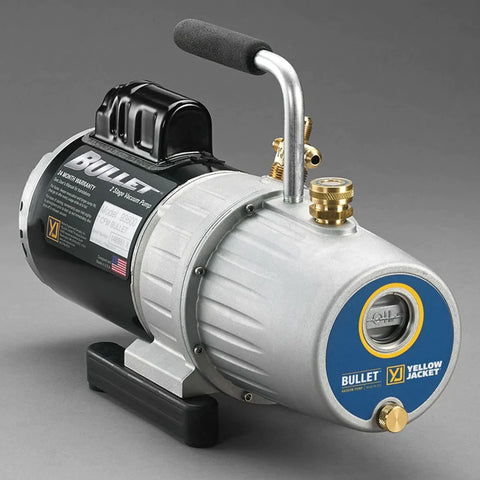
A vacuum pump removes excess air and water vapour from the air-conditioning unit while running. The first step in any air conditioning repair is frequently to recover the refrigerant from the unit for later use.
After completing the recovery process, you can proceed with the necessary diagnostic and repair procedures. The next stage is to inspect the system for leaks; corrective action must be taken if any are discovered.
During the evacuation, the vacuum pump extracts the air and moisture from the refrigerant system. After completing this step, the system can be thoroughly tested before the charging process begins.
Using an HVAC Vacuum Pump
Although maintaining your AC line-set clean might appear difficult, it's rather easy. Although we'll call it vacuuming, most specialists call it drawdown. Of course, the goal is to keep moisture and air out of the copper tube.
You know how costly compressor repairs are if you have ever needed to get one done. If you don't vacuum your AC line set, your compressor may experience major issues.
A vacuum pump removes excess air and water vapour from the system when the air conditioner is running. Typically, the first phase in any air con repair is to recover the refrigerant from the system for later use.
After the recovery task, you can move on to the required troubleshooting and repair operations. The next step is inspecting the system for leaks; if any are found, remedial action must be conducted.
During the evacuation process, the vacuum pump extracts the air and moisture from the refrigerant system. After completing this, the system can be fully tested before the charging process starts.
Brief Buying Guide
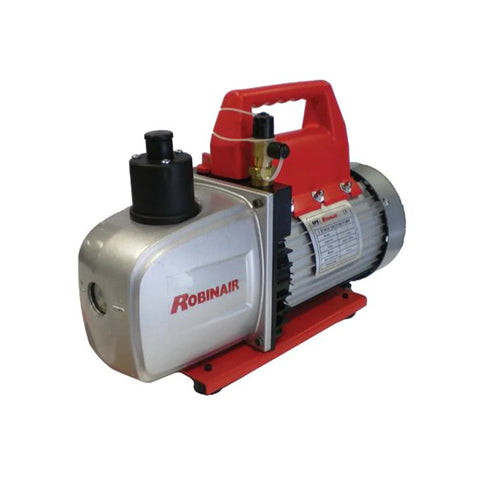
Essential Equipment for Maintaining Your Air Conditioner
Proper maintenance of an air conditioning system requires the right tools. One crucial tool helps remove moisture and contaminants from the system before repairs or refrigerant refills. Before investing in one, consider the following factors:
Key Features to Consider
- Airflow Rating: The capacity of the tool is measured in cubic feet per minute (CFM). A higher CFM rating indicates faster performance.
- Power Rating: The efficiency of a tool is often determined by its horsepower (HP). Common models include 1/4 HP and 1/3 HP, with the latter providing higher performance.
- Single vs. Dual-Stage: While both serve the same purpose, dual-stage models offer enhanced efficiency and deeper evacuation.
Choosing a High-Quality Tool
Performance & Reliability
When servicing an HVAC system or an automotive AC unit, it’s important to use durable and efficient equipment. Low-quality tools may leak or fail to create the necessary vacuum for optimal system performance.
User-Friendly Features
Check specifications such as motor size and pressure capacity. Some models come with attachments for added convenience, helping with system maintenance and leak detection.
Noise Level Considerations
If you use the tool at home or for extended periods, selecting a quieter model can improve your experience. Look for options designed for low noise output while maintaining strong performance.
Find the Right Tools at HVAC Shop
At HVAC Shop, we offer a wide range of high-quality equipment tailored to both professional and DIY users. Browse our selection today to ensure smooth and efficient system maintenance.
CAN YOU USE A VACUUM PUMP TO RECOVER REFRIGERANT

No. It needs to be the correct type of pump.
The refrigerant is extracted from a system by a recovery machine and placed in a designated tank. In essence, a recovery machine is a small refrigerated compressor.
Vanes are mounted on a shaft within a vacuum pump chamber, and the entire assembly is submerged in specialized oil. It is vacuumed to dry the system and includes oil and refrigerant to remove non-condensables (air, moisture).
Non-condensable substances can result in high pressures, poor efficiency, and the formation of corrosion, acid, and other issues inside the system.
What's the Importance of Vacuum Pumps?
Only the refrigerant and oil must be circulating in a refrigeration system. Air may penetrate the system while serviced or after several years of use. Nitrogen, oxygen, and moisture are all elements of the air from the atmosphere that gets into the system. These undesirable elements will result in the following:
- Higher discharge temperatures and compression ratios are brought on by increased head pressure. The system's effectiveness is decreased.
- The compressor is one of the most expensive components of the system. The motor's insulation is harmed by the acids the refrigerant creates during chemical reactions that lead to electroplating. Over time, acids also cause the metal parts to corrode. If the insulation in the compressor motor begins to deteriorate, short circuits will happen, harming the compressor.
- Sludge is produced when the system's acid, oil, and moisture combine. It will eventually lead to the expansion device, filter dryer, and trainers operating poorly.
Moisture: Your Enemy
All protective caps are taken during the new system setup, and the system components are then exposed to moisture and air. Air, a non-condensable, gathers on the high side of the system and lowers system efficiency if it is present. The head pressure increases as a result. Compressor failure results from forming organic substances at the discharge valve, which becomes hotter than usual.
A refrigerant system's moisture can also condense into ice, which blocks expansion valve and cap tube openings and prevents sufficient cooling. In the end, steam, air, and refrigerants containing chlorine might produce acids, sludge, and malfunctions while under warranty.
The likelihood of an issue increasing with air humidity is simple math. Air and moisture can enter the system through leaks. Air and humidity can re-enter the system during maintenance and part replacement.
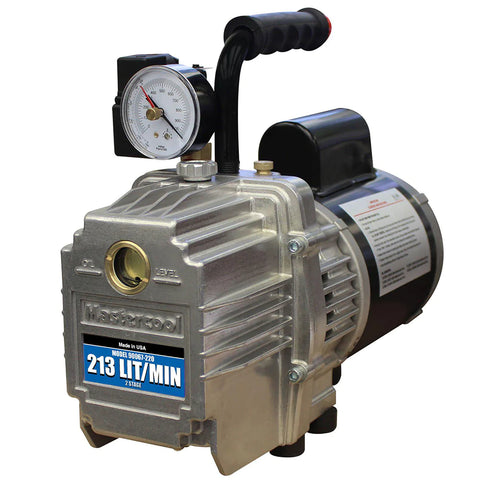
Vacuum Cleaning
Deep vacuum denotes reduction to the utmost extent conceivable. A vacuum is where all gases, including air, have been expelled. The pressure inside the system falls below the air pressure outside when air is drained. In other words, the air pressure is lower than in a vacuum. A vacuum pump eliminates moisture and air from the system before it is harmed. More moisture is removed from the air when the vacuum is deeper and more thorough, and less unwanted water or other pollutants are likely to cause problems with the system.
The temp at which moisture boils within the system decreases along with the internal pressure. For instance, water boils at only 6°F at an internal pressure of 29.87 inches. The moisture easily transforms into a vapour, which a pump removes at that pressure. The more water is drawn out of the system, the deeper and more thoroughly the vacuum is performed.
The equipment has completed its task, and the evacuation procedure is complete after the electronic vacuum gauge (which should be attached to the AC/R system) has achieved the desired reading.
CAN A VACUUM PUMP BE USED AS A COMPRESSOR?
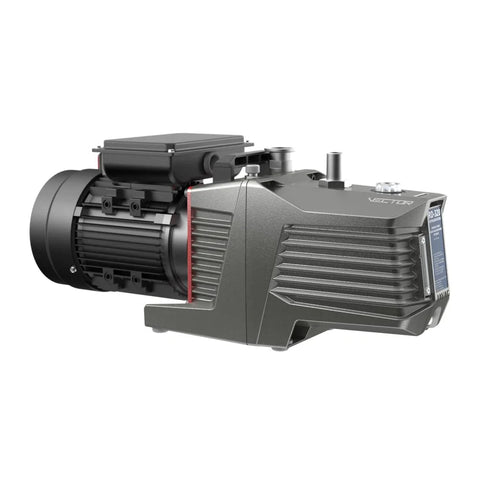
Vacuum pumps aren't the same as air compressors. They do, however, share a similar design and operation. You can think of an air compressor's function as a vacuum pump with a few adjustments. The opposite configuration is also feasible but might be less effective because air compressors need more power.
A vacuum pump is an air compressor that works in reverse. If you have access to the compressor vacuum pump's air intake, you can convert it. You may connect your vacuum hose to the compressor's intake end.
You may want to purchase an air compressor but want to save money on something other than a vacuum pump. However, air compressors should be used with caution due to their strength. It is recommended to convert a compressor into a vacuum pump if you are an expert.
Fortunately, products on the market combine an air compressor with a vacuum pump.
Difference Between a Vacuum Pump and Air Compressor
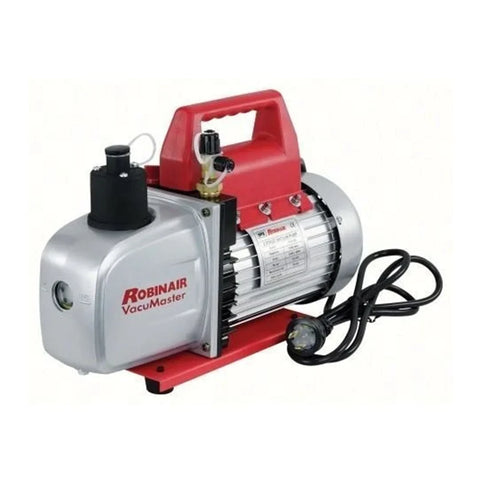
A vacuum pump that uses an air compressor operates similarly. Nonetheless, it has a different purpose. We have emphasised the differences and potential application areas to make it easier for you to understand.
- Construction
There are several air compressors, including screw, reciprocating, scroll, and many more. These compressors all function differently. These versions are additionally offered as a vacuum pumps. Your air compressor can also be used as a vacuum pump.
- Working Principle
A scroll air compressor and a scroll pump, which employ the same technology, have identical parts but different functionalities. A vacuum pump drains a space, whereas a compressor fills one. So, if parts of an air compressor move clockwise, parts of a vacuum pump revolve anticlockwise.
- Material
Only gas or air can be used with a compressor because liquids are essentially incompressible, while air compressors compress things. However, a vacuum pump may move any fluid (liquid or gas) since it does so without compressing it.
- Storage System
A storage cylinder is required to hold the gas or air that an air compressor is compressing. In contrast, a vacuum pump doesn't need a storage cylinder since some vacuum systems would draw air from the associated medium or cavity and release it into the open atmosphere.
- Flow Rate
An air compressor's flow rate doesn't change over time. However, when vacuum pressure rises, a vacuum pump's flow rate begins to fall.
- Capacity
The amount of air that an air compressor can compress depends on its capacity; this quantity is commonly represented in cubic feet per minute (cfm). While the pressure or vacuum determines the ability of a vacuum pump, it can produce, widely represented in mbars.
What Is the Function of a Vacuum Pump and Dual Air Compressor?
On the market, tankless variants make up the majority of combination compressor vacuum pumps. An air compressor and vacuum pump combo system often have two heads, unlike a standard compressor. But there are additional units with various configurations.
One head regulates the air compressor pressure in a dual compressor vacuum pump unit. The other head is used for vacuuming. Can we, therefore, utilize both functionalities at once? Sadly, you can only do it with a separate vacuum pump and air compressor set since a dual-purpose device would only include one compressor. Therefore, both functions may be used at different times.
WHAT HAPPENS WHEN THE VACUUM PUMP FAILS?

The restricted crankcase of an internal combustion engine running on unleaded fuel experiences extraordinarily high pressure. A vacuum pump releases the pressure to power many belts and pulleys, particularly alternators and AC units. Contrarily, a diesel engine needs vacuum pumps for a wide range of power systems, mainly the air conditioning and brake systems. The vacuum pump continues to operate as long as the engine's cylinders remain firing. Once the vacuum pump breaks down or ceases to work, the whole performance and functionality of the vehicle may be significantly affected.
On diesel engines that use the vacuum pump, the possibility of mechanical failure or complete breakage is higher because the vacuum pump is continually in use. The three primary reasons vacuum pumps fail are faulty vacuum hoses, broken belts, and inner electrical problems. The vacuum pump usually affects a gasoline-powered car's exhaust or emissions system. Still, if it's not maintained properly, it can seriously harm the parts of the cylinder head.
If the engine is running, the pump runs continuously, so wear and tear will inevitably lead to failure. You'll notice a decrease in braking performance when this occurs. You'll also note that keeping the cabin at a constant temperature is difficult if your car's vacuum pump powers the air conditioning.
Common Reasons Why a Vacuum Pump Fails
The following are some of the most frequent reasons for vacuum pump failure.
- Contamination is brought on by gas or liquid within the pump
- Contamination as a result of poor installation
- Mechanical breakdown brought on by component wear and tear
- Internal corrosion brought on by worn-out or faulty seals
- Worn transmission components, such as a misaligned bearing
- The shell that has cracked or broken because of internal stress or overload
Signs of Vacuum Pump Failure

- Noise
Your vacuum pump may be on the verge of failing if it makes loud or unusual noises. A certain pump component eventually dies due to aging and accumulated wear throughout use. An increase in noise frequently indicates that a pump needs to be cleaned and maintained. Diaphragms, valve plates, and seals are simple to replace, but increased bearing, motor, or air noises may necessitate more involved fixes.
- Longer Processing Times
The vacuum pump performance may be affected if debris or other pollutants enter the chamber or valves. Pumps may be in danger of failure if procedures take longer than expected.
At this point, you must thoroughly clean your pump and ensure no pollutants get to other components. This action is necessary for the contaminants to keep harming pumps and necessitate further upkeep or repairs. Additionally useful for keeping pollutants out of your system.
- Overheating
Diagnostics of heat-related vacuum pump failures might be challenging. Other contributing factors include poor ventilation, an unsuitable pump application, or a defective motor. A fault may be indicated by persistent overheating.
Check the ventilation ports on the pump before proceeding with any troubleshooting for an overheating pump. Repositioning the pump may be necessary to resolve this problem if these openings are closed or placed too near another object.




















